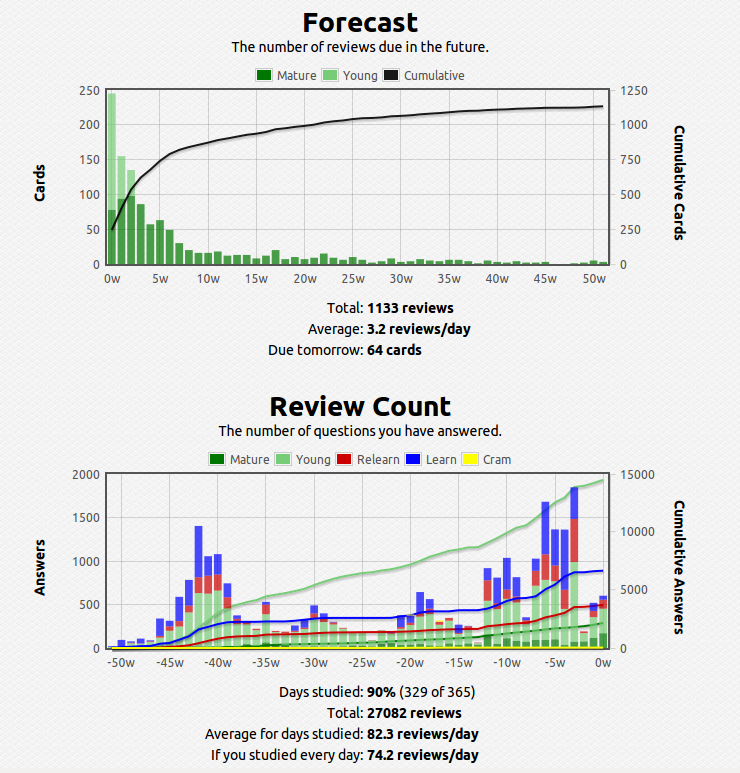Let \(\mathbf{y}\sim \text{MVN}(\mu,\mathbf{V})\), where \(\mathbf{y}\) has \(n\) elements but the \(Y_i\)’s are not independent so that the number \(k\) of linearly independent rows (or columns) of \(\mathbf{V}\) (that is, the rank of \(\mathbf{V}\)) is less than \(n\) and so \(\mathbf{V}\) is singular and its inverse is not uniquely defined. Let \(\mathbf{V}^{-}\) denote a generalized inverse of \(\mathbf{V}\) (that is a matrix with the property that \(\mathbf{V}\mathbf{V}^{-}\mathbf{V}=\mathbf{V}\)). Then the random variable \(\mathbf{y}^T\mathbf{V}^{-}\mathbf{y}\) has the non-central chi-squared distribution with \(k\) degrees of freedom and non-centrality parameter \(\lambda=\mathbf{\mu}^T\mathbf{V}^{-}\mathbf{\mu}\).
Whenever I read a paragraph like this, a few things pop into my mind: 1) I should have paid more attention in linear algebra class, 2) my current method of study isn’t conducive to long-term memory retention, and 3) how many of my peers really have a firm grasp over statistical theory?
It’s painful. Mathematics texts, especially advanced undergraduate/early graduate texts such as this one, require the reader to have a firm grasp of prerequisite subjects. In the example above, I’ve forgotten most of the terminology, and at best I have a vague recollection of some of the vocabulary from my freshman matrices course. Linear independence, rank, and invertibility will be easy to look up – those are taught early on in a typical linear algebra course. Only then will I be able to confirm that if the rank of V is less than n that V is singular and its inverse is not uniquely defined. And then there’s the concept of a generalized inverse. That’s not something I ever covered as an undergrad and I’ll need to learn what that means.
For a paragraph like this, I have a few options. Looking up forgotten terminology is a must, but what about the terms I haven’t seen before? With the case of a generalized inverse, I might have to spend an hour or two practicing before I can move on to the next paragraph. For more obscure concepts, learning them might take several days or more – but then there’s the practical constraint on things I need to accomplish at work, so sometimes I will need to assume that a claim is true, move on to the next paragraph, and look into it later after I’ve learned more math.
Nowadays it’s becoming increasingly common for me to read books that require me to draw on previous knowledge from several subjects. In the case of generalized linear models, I need to know linear algebra, calculus, statistics, and computer programming. This means that as I move on to more advanced subjects, I no longer have the liberty to promptly forget something after I’ve covered it. Therefore, at this point I’ve made the decision to restructure my learning technique to be more conducive to long-term retention.
I’ll need to reduce the pace at which I’m moving through textbooks. Up until now I’ve been reading textbooks at a pace of 10 pages per day, maybe reading 3 textbooks at a time. That’s too fast – it isn’t slow enough for me to be able to transfer material from short-term to long-term memory (see my post on spaced repetition). But then, if I did that, my learning would slow down to a crawl and I’d die before I really learned anything – so I’ll need to study additional subjects to make up for lost volume. Therefore, my schedule will resemble something closer to reading 10 books at the same time but only 3 pages per day. After each 3-page session, notecards are compiled, and after all 10 books are read the cards are combined and then reviewed. This technique is called interleaving – simultaneously learning from several different subjects at once. The reason why this technique is so effective is because rarely do real-life problems present themselves in the ordered, compartmentalized fashion that we are accustomed to in the classroom – essentially, uninterleavened practice fails to recognize that real-life problems are chaotic. Interleavened study makes practice closer to performance.
I haven’t decided what to do with the 70 Days of Linear Algebra project that I postponed after moving. That project doesn’t fit my new model of study, but I’d still like to finish it. Most likely, I’ll try to pick up where I left off while applying the new model to subsequent pursuits.
